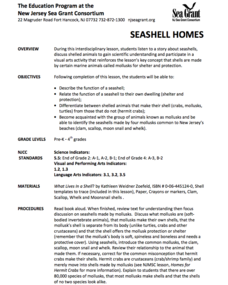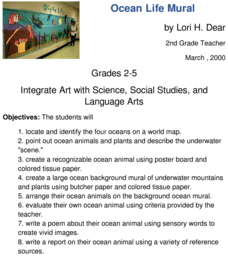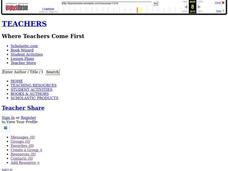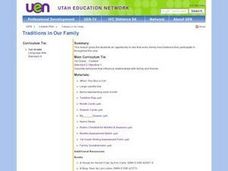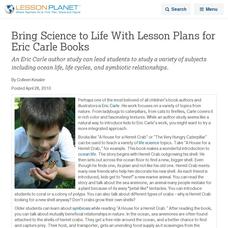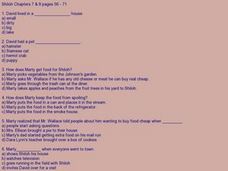Curated OER
A House for Hermit Crab
Make predictions and recall details while reading A House For Hermit Crab. While you read the story, discuss aspects of the plot and encourage listeners to respond. Extension activities such as crafts, counting, puppets, and using your...
Free Reading
A House for Hermit Crab
Students are read A House for Hermit Crab, by Eric Carle. For this vocabulary focused lesson, students discover the meaning of at least three new words. They discuss the new vocabulary, as a class, before and after the story is read....
Scholastic
A House for Hermit Crab
Engage young marine biologists in a reading of Eric Carle's A House for Hermit Crab with a fun hands-on activity. Given a set of clipart images of the different aquatic animals that appear in the book, children identify each one during a...
Curated OER
Homes for Hermit Crabs
Students discover the differences between hermit crabs and mollusks and identify their parts. After reading a story about hermit crabs, they complete an anatomy worksheet. For another activity, students fold and cut a diagram of a hermit...
Curated OER
Is This a House for Hermit Crab?
First graders identify text that uses sequence or other logical order. They identify and interpret how different plants and animals inhabit different kinds of environments and have external features that help them thrive in different...
Curated OER
Seashell Homes
Pupils listen to a story about seashells. They discuss shelled animals. Learners describe the function of seashell. Pupils relate the function of a seashell to their own dwelling. They differentiate between shelled animals that make...
Curated OER
The Search for Housing Pagurus hirsutiusculus= hermit crab
Students collect snail shells, measure and record their lengths and if they are occupied by a hermit crab. They discover if their is a size difference between occupied and unoccupied shells.
Weebly
Author Study: Eric Carle
Dive into an author study of one of the most beloved children’s book authors, Eric Carle. After reading some of his stories, including Papa Get me the Moon, A House for Hermit Crab, The Grouchy Ladybug, and The Very Busy Spider, readers...
Curated OER
Henry Howls
Let's learn the letter h! Elementary learners will hear the sound, learn a catchy tongue twister, and identify the sound in different words the teacher says. After some writing practice, read A House for Hermit Crab, by Eric Carle, to...
Curated OER
A House for Me- Ocean Environments
Learners explore ocean environments. For this ocean environment lesson, students identify the things ocean animals need for survival. Learners use KWL charts and search the Internet collecting information about ocean habitats. Students...
Curated OER
Ocean Life Mural
How many oceans can you name? First, have learners try to name as many oceans as they can, and then have them locate and identify the oceans on a world map. They create a recognizable ocean animal using poster board and tissue paper....
Curated OER
Exploring Bloom's Taxonomy Through Eric Carle Collage Technique
Students participate in shared readings of Eric Carle's books and investigate the art and story elements. They create a collage and answer questions.
Curated OER
Starfish
Learners explore the concept of starfish. In this starfish lesson, students identify the parts of a starfish and how their body works. Learners create a starfish using paint and a cornmeal mixture. They then glue on Cheerios to...
Curated OER
Children's Literature Across the Curriculum Ideas-The Very Hungry Caterpillar
Students read The Very Hungry Caterpillar by Eric Carle. They complete a variety of cross-curricular activities surrounding the study of caterpillars. Included are reading, art, math, science, writing, social studies, and library...
Curated OER
New Traditions in Our Family
First graders discuss the importance of traditions in families. In groups, they share their traditions at certain times of the year. As a class, they read "When This Box is Full" and create a box representing the different seasons. ...
Curated OER
Exploring Feeling Through Eric Carle
Students construct a "feeling cube" for the purpose of exploring and discussing feelings. Students read "The Hungry Caterpillar" discussing life cycle and making a sock puppet, discussing the feelings explored during the activity and the...
Curated OER
Bring Science to Life With Lesson Plans for Eric Carle Books
An Eric Carle author study can lead students to study a variety of subjects including ocean life, life cycles, and symbiotic relationships.
Curated OER
Remember Me Bag and Other Gift Ideas
Pupils make end of the year gift bags in the forms of a bag with different materials in it. In this crafts lesson, students put stationary, lollipops, stamps, bookmarks, pencils, and other materials into the bags.
Curated OER
Ship-Fish or Fish-Ship
Learners read two books about fishing and ships. After viewing portraits, they identify and describe the various types of sailing vessels. They discuss how the artist showed water and detailed the areas around the ships. They create...
Curated OER
Hurry Hurry!
First graders identify the fact that groups of phonemes form spoken and written words. They practice working with identifying words that have the letter "h" and point to its position in words.
Curated OER
Animals and Their Needs
Students identify the characteristics of living things and examine objects to see if they are living. They identify the needs of living things, in particular of animals and animal babies. They discuss how to care for pets.
Curated OER
Language Arts: Five Senses Walk
First graders take a discovery walk around the school. They use their observations to compose a class book about their school.
Curated OER
What's in the Water?
Students examine how pollutants can affect ocean animals. In this pollution lesson, students read a story about the ocean floor, think about what would happen to the plants and animals if the ocean became dirty or polluted, and conduct...
Curated OER
Shiloh Chapters 7 and 8
In this comprehension worksheet, students read chapters 7 and 8 of Shiloh and complete multiple choice questions. Students complete 10 questions.







